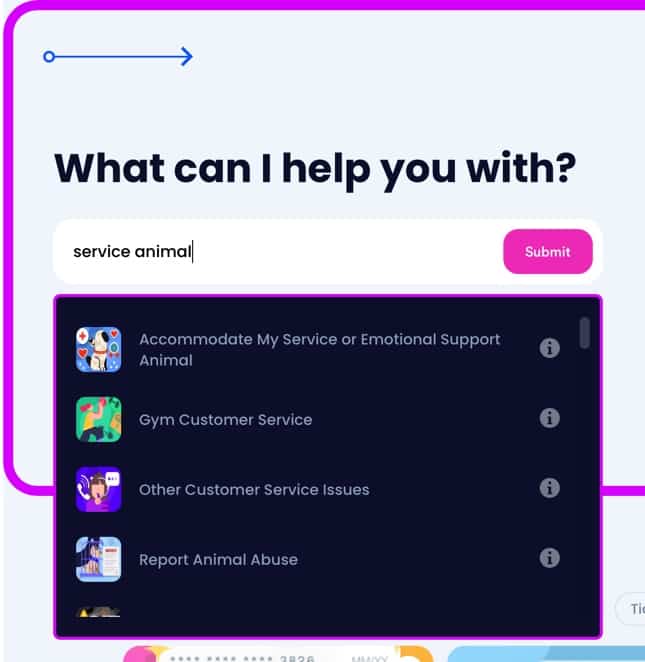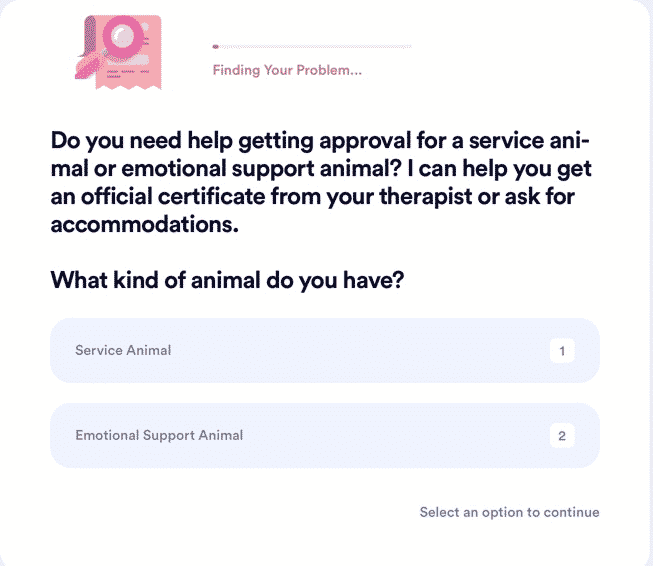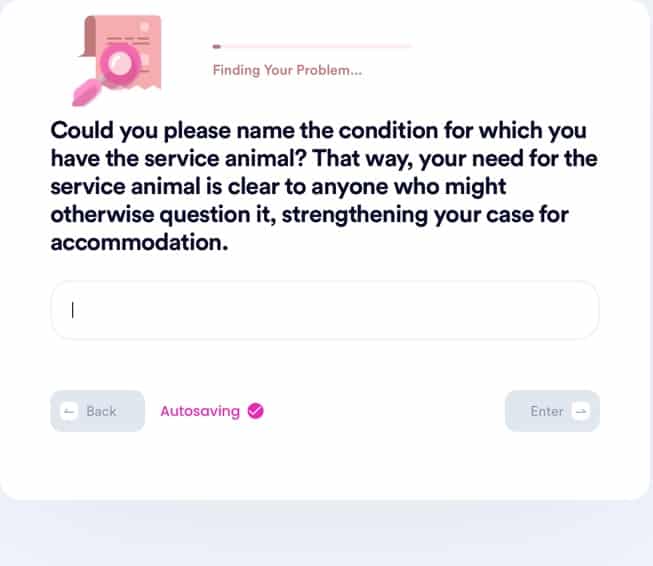Can a Landlord Require Insurance for an Emotional Support Animal
Loneliness and mental health problems are considered a global epidemic.
A report from the World Health Organization (WHO) shows a direct link between loneliness and the growing cases of mental health disorders. The saddest part is that the epidemic cuts across people of all ages.
Emotional support animals (ESAs) go a long way in helping people dealing with mental struggles by providing emotional support. Anyone can have a pet, but not an emotional support animal. Getting an ESA is a long and complex process that involves a ton of paperwork.
DoNotPay can help you get an emotional support animal and request its accommodation in any premises without a hassle. What's more, we can help clarify all information about emotional support animals, such as the need for rental to help you understand your rights.
What Is an Emotional Support Animal?
An emotional support animal is no ordinary pet. It's one that's prescribed by a licensed therapist or mental health specialist for the sole purpose of helping the owner manage mental health problems.
When it comes to treating mental health issues, medication is often considered a last resort except for severe cases. Therapists and psychiatrists recommend lifestyle changes and other techniques to help their patients. As such, the use of emotional support animals (ESAs) has grown in popularity given their efficacy in managing mental health problems.
What Is an ESA Letter?
An emotional support letter is an official document written by a licensed mental health professional as proof that a person requires an emotional support animal for a specific disability.
An ESA letter overrides any pet rules and restrictions, helping you access services or entry into places where there are pet restrictions.
If you require an ESA, talk to your therapist or psychiatrist to write you one. DoNotPay can also help you request an ESA letter from a professional.
| Common mental conditions that qualify individuals to receive an ESA letter: |
|
| Licensed healthcare specialists that are able to write up an ESA letter: |
|
What Are the Requirements for Keeping an ESA in a Rental House?
Anyone with a valid ESA letter and an approved animal under the ESA policies and guidelines can keep their animals in any type of housing even if pets are not allowed.
Landlords are required by law to make accommodations for people with disabilities. Should you be turned down by a landlord for owning an ESA, DoNotPay can help you file a demand letter or file a formal complaint.
What Can a Landlord Ask About an Emotional Support Animal?
Every citizen's personal medical information is protected under HIPAA laws. As such, a landlord cannot require you to disclose any information regarding your emotional support animal. The only document a is entitled to is the ESA letter, proving that the pet in question is indeed an emotional support animal.
Can a Landlord Require Insurance for My ESA?
Most landlords that allow pets in their premises require proof of pet insurance. However, not all pet laws and policies apply to emotional support animals.
Your landlord can't insist on pet insurance or other additional payments for the ESA in order to rent out a house to you. That said, you are solely responsible for any damage caused by your ESA either to the premises or other persons.
Having pet insurance may come in handy in such cases. Pet insurance covers:
- Surgeries
- Unexpected injuries
- Damages
- Tests
- Exam fees
- Emergency care
Can a Landlord Deny My Emotional Support Animal?
Denial of an ESA is considered as discrimination against people with disabilities. ESAs are recognized as assistance animals under the Fair Housing Act. The laws bar landlords from denying accommodation to a person who owns an ESA, and they may be prosecuted for discrimination.
What Animals Can be Kept as Emotional Support Animals?
Not every animal can be an ESA. The restrictions for types of emotional support animal are domestic animals only, such as:
- Dogs
- Cats
- Birds
- Rabbits
- Sheep
- Goats
- Pigs etc
Note: Emotional support animals that are similar to normal household pets are subject to vaccination and licensing in accordance with the specific state or city pet laws.
How to Get an Emotional Support Animal on Your Own
To qualify for an ESA, you must demonstrate the need for having one by being diagnosed with a mental health problem. Only a licensed mental health practitioner can prescribe an ESA for any patient.
You can apply for an ESA in the following steps:
1. Speak to your therapist
2. Find the ideal pet for you
3. Fill in adoption forms for the animal
4. Get the right pet license, i.e. neuter certificate, pet tags if necessary
5. Submit the forms to your therapist for approval of the ESA letter
Request Emotional Support Animal Accommodation With the Help of DoNotPay
You don't have to go through the struggles of finding a professional to write you an ESA letter or follow up with your landlord on making exemptions for your ESA. DoNotPay can help you work out all your ESA issues in no time.
- Search "service animal" on DoNotPay.

- Select the type of issue you need help with, including contacting your landlord about your ESA/service animal, asking your airline about ESA options, or requesting ESA/service accommodations at other venues.

- Answer a series of questions about your current situation and the details of your ESA/service animal, so we can generate the best results for you.

What Else Can DoNotPay Help You With?
There's so much more that DoNotPay can help you with besides matters to do with emotional support animals such as:
- How to travel with an ESA in airlines
- Requesting an ESA letter for housing
- United Airlines policies on ESAs
- American Airlines policies on ESAs
- Southwest Emotional Support Animal
We work with all government entities, private companies, service providers and agencies to help you get quick access to information and services with one click of a button.
Whether it's matters, day to day activities such as bill payment or license renewal services, we've got you covered. Here are some of the services you can access with our tailored DoNotPay products:
- Get your divorce certificates
- Notarize your documents
- Cancel subscriptions for any company
- Send Demand Letters To anyone in small claims court
- Get access to burner phones
- Renew your vehicle registration
- File
- File SEC complaints
 By
By